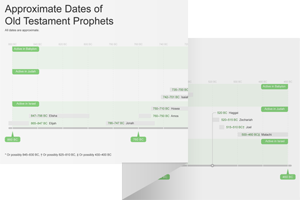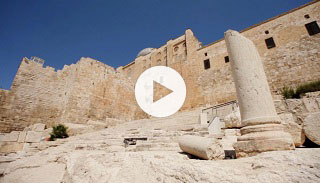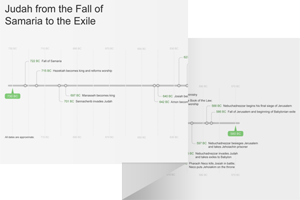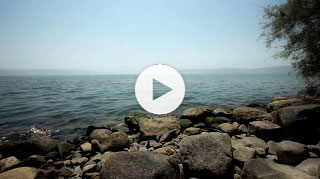1:1–18 Like Joel, the major theme of Zephaniah |
1:1 Zephaniah’s genealogy is the longest of the writing prophets. The writer includes this lengthy genealogy to show that Zephaniah was the great-great-grandson of King Hezekiah. Zephaniah’s royal lineage makes him a distant relative of King Josiah, during whose reign he prophesied. The prophet’s position in the royal family provided him with an ideal opportunity to witness the apostasy of Judah’s leaders firsthand (see vv. 8–12; 3:3–4). |
The word of Yahweh A standard introductory formula (see also Hos 1:1; Joel 1:1; Mic 1:1; Hag 1:1; Zech 1:1).
 Prophetic Commissioning and the Divine Presence
Prophetic Commissioning and the Divine Presence
Zephaniah A prophet of Judah who ministered during the reign of Josiah (640–609 bc).
Zephaniah means “Yahweh hides” (or “protects”) or “Yahweh has hidden.” The name may refer to God’s protection of Zephaniah in his childhood during Manasseh’s wicked reign (2 Kgs 21:16). As a member of the royal family, Zephaniah would have lived in Jerusalem, which explains his familiarity with the capital city (e.g., Zeph 1:10–11). Zephaniah’s contemporaries include Habakkuk and Jeremiah. |
Hezekiah Hezekiah, who reigned from 729–686 bc, was a king who did right in the sight of Yahweh (2 Kgs 18:3).
who reigned from 729–686 bc, was a king who did right in the sight of Yahweh (2 Kgs 18:3).
Josiah Josiah reigned from 640–609 bc, having gained the throne at only eight years of age. He initiated many reforms during his reign and would be known as the final “good” king of Judah.
reigned from 640–609 bc, having gained the throne at only eight years of age. He initiated many reforms during his reign and would be known as the final “good” king of Judah.
1:2–6 The prophet begins this section with a general announcement of worldwide destruction (Zeph 1:2–3) and then announces Judah’s destruction specifically (vv. 4–6). |
1:2 I will surely destroy everything Signaling complete destruction of all who do not worship Yahweh (compare vv. 4–6).
1:4 my hand An anthropomorphic figure attributing human characteristics to God that is commonly used to emphasize God’s judgment (see Isa 5:25; Jer 21:5).
Judah The southern kingdom of Israel. The territory is named for the tribe of Judah, the descendants of the fourth son of the patriarch Jacob and his wife Leah.
Jerusalem The religious and political capital of Judah.
Means “city of peace”; located 14 miles west of the Dead Sea and 33 miles east of the Mediterranean Sea. The city |
Baal The Canaanite storm god. The prophets consistently condemned the worship of Baal (compare 1 Kgs 18:20–21; Jer 2:8, 23; Hos 2:13; 11:2).
 Pagan Deities in the Old Testament Table
Pagan Deities in the Old Testament Table
idolatrous priests Refers to the priests who served foreign gods at the high places.
with the priests Refers to the apostate priests who served in Jerusalem. Since this phrase may represent a later explanatory gloss, certain translations do not include it (e.g., niv).
1:5 the rooftops Ancients worshiped fertility gods such as Baal on high places because they believed the gods could then watch from their heavenly dwelling places.
the host of heaven Refers to gods.
those who bow down, swearing to Yahweh The Israelites had developed a syncretistic form of religion, blending the worship of Yahweh with the worship of pagan gods like the chief god of the Ammonites, known as Molech (or Milcom,
(or Milcom, Milkom, or Molek; 1 Kgs 11:5–7; 2 Kgs 23:10–13).
Milkom, or Molek; 1 Kgs 11:5–7; 2 Kgs 23:10–13).
1:7 Be silent The Hebrew term used here is an onomatopoetic expression, much like the English term “Hush!” (Hab 2:20; Zech 2:13).
the day of Yahweh The prophets use this phrase to denote the time when God will intervene in human affairs and judge the wicked (see Isa 13:6, 9; Ezek 30:3; Joel 1:15; 2:1; Amos 5:18; Obad 15; Mal 4:5).
has provided a sacrifice Refers to a sacrificial feast to which guests are invited (Deut 12:17–18; 1 Kgs 1:9–10, 24–25).
has consecrated Meaning they were “set apart” or “dedicated.”
1:8 the officials The Hebrew term used here designates city officials (Judg 8:6), provincial supervisors (1 Kgs 20:14), military leaders (2 Kgs 5:1), and religious leaders (Ezra 8:24). These officials were especially important during the early years of Josiah’s reign since the king was too young to govern the nation himself.
the sons of the king Refers to Josiah’s sons, the princes. Ironically, the guests of the banquet would become the sacrifice.
who dress in foreign clothing Though the prophet may refer figuratively to adopting pagan customs, the literal meaning is also possible.
1:9 violence and deceit Several other prophets also bemoan the presence of violence among the Israelites (see Jer 6:7; Amos 3:10; Mic 6:12; Hab 1:2).
1:10–11 All three of the districts mentioned in Zeph 1:10–11 are located on the northern side of Jerusalem, the section where Nebuchadnezzar broke through the walls of the city in 586 bc. |
1:10 the Fish Gate An entrance to Jerusalem located on the northern section of city walls. It was the site of a fish market (2 Chr 33:14; Neh 3:3; 12:39). Since this gate was on the north side of Jerusalem, the fish sold here probably came from the Sea of Galilee.
Second District A newer section of the city, probably located near the Tyropoeon Valley on the north side of the city. It was probably built after the construction of the temple to provide housing for those who worked in the temple and surrounding area.
from the hills Refers to the western (Mount Zion), central (Mount Moriah), and eastern (Mount of Olives) hills of Jerusalem.
1:11 the Mortar The Hebrew term used here doesn’t appear anywhere else in the Bible. It may be a place name associated with a site in the northern Tyropoeon Valley.
the traders The Hebrew phrase used here is literally translated “people of Canaan,” but it usually denotes traders or merchants because the Canaanites were known as traders.
1:12 whose senses are dulled from drinking The Hebrew phrase used here appears nowhere else in the ot. It describes the residents of Jerusalem, who do not believe that Yahweh will interfere in the affairs of the nation and are at ease.
1:14 bitterness The Hebrew term here could be an adjective describing the sound as bitter or an adjective characterizing the mighty man crying out bitterly.
1:15 trouble and distress The imagery of distress, disaster, and darkness echoes similar language used to describe the Day of Yahweh by other ot prophets (e.g., Obad 12; Isa 13: 9; Amos 5:18; Ezek 30:3; see note on Joel 2:2).
1:16 a day of trumpet and trumpet blast The trumpet warned the people of coming danger. See Jer 4:5 and note.
1:17 their entrails Yahweh declares that the carcasses of the slain will fertilize the earth like dung.

|
About Faithlife Study BibleFaithlife Study Bible (FSB) is your guide to the ancient world of the Old and New Testaments, with study notes and articles that draw from a wide range of academic research. FSB helps you learn how to think about interpretation methods and issues so that you can gain a deeper understanding of the text. |
| Copyright |
Copyright 2012 Logos Bible Software. |
| Support Info | fsb |
 Loading…
Loading…


 Zephaniah
Zephaniah 

 Jerusalem
Jerusalem 

